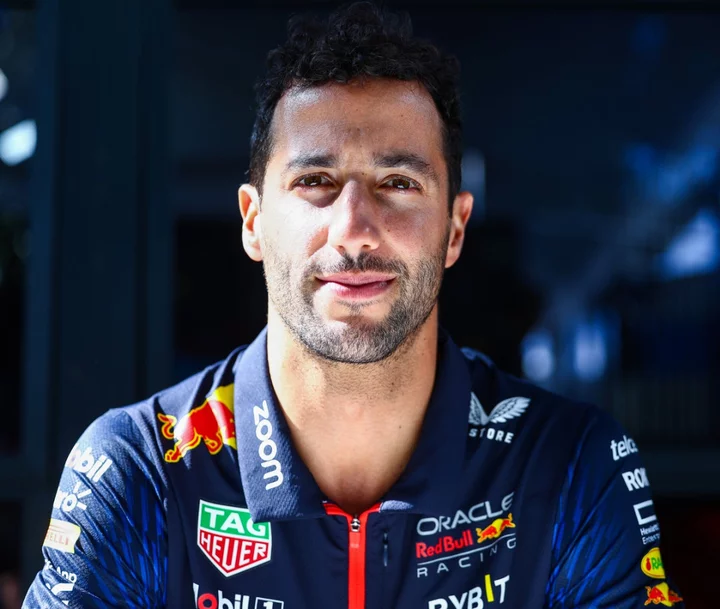
Daniel Ricciardo is back - and this time he wants to go out on top
Daniel Ricciardo is pondering. This year, a presence in the paddock – but not on the racetrack – has been a curiously flummoxing existence for someone so synonymous with a seat at the 20-man table. In his own words, he has been doing “everything the drivers are doing… other than the driving.” So aside from the obvious of the lights-to-flag racing, what has the Australian found the most difficult about his eight months away from Formula 1? “I’d say the starting grid on Sunday,” he says, a glint in his eye, a longing for something previous. “I love that feeling before you’re about to race. It’s intense, it’s nerve-racking but it’s awesome. I miss that buzz.” Well, miss it no longer. The Honey Badger is back. Officially on loan from Red Bull to sister team AlphaTauri for the remainder of the season, Ricciardo last week replaced the axed Nyck de Vries and will be in the cockpit in Hungary this weekend. It represents a lifeline – his lifeline – back into the sport, a carving of an opportunity so desperately craved. In the end, he only missed 10 races. And all it took was one Silverstone tyre test after the British Grand Prix, at the wheel of the fastest car in F1 this year. A pace which would have put him on the front row of the grid a few days earlier. Never a duo to hesitate, Red Bull chiefs Helmut Marko and Christian Horner made the call swiftly. “After Abu Dhabi last year, I wasn’t sure if I’d ever race again,” he reveals to The Independent, with a casualness which implies a deep-down admittance that he wasn’t done just yet. “But coming back this year, I removed all ego and status. “I do think this year will be the best thing that’s ever happened to me and it will boost me now for the rest of my career. It honestly came at the right time… everything happens for a reason.” How a career can change in a year. Because, although we didn’t know it at the time, last year’s British Grand Prix was the breaking point for McLaren and Ricciardo’s uncomfortable marriage. A day after the Aussie finished second-last out of all the finishers at Silverstone, McLaren big boss Zak Brown made initial contact with Oscar Piastri. As Ricciardo interjects, this is where “all the s*** went down!” Nothing short of gutted at the time – “it sucked” – the 34-year-old now takes the judgement call as a positive. A chance to regroup, reassess and especially in the initial stages, relax. “I’ve really enjoyed this time off, to have the time for myself,” he says. “Last week I went home to Australia for my birthday, I haven’t done that since I was 17… so 17 years ago. “It honestly came at the right time. Look, I wish those two years were better. But it’s given me a mental break because the competition is intense, as much as we love it. It consumes a lot of you so I feel for me to bring my cortisol levels down a little bit, I just feel a lot more balanced this year.” Ricciardo hadn’t missed a grand prix since June 2011. 11 years, 232 races later and so came to pass a rest he now admits was much-needed and well-utilised. A huge NFL fan and a supporter of the Buffalo Bills, he attended the Super Bowl in Arizona. The same week, he thrived in the modern anarchy of golf’s WM Phoenix Open. He even went to the prestigious Met Gala in New York. But more than any showbiz spectacles, he felt like a normal human being again. “I didn’t want to see a gym for a while,” he says. “I just wanted to eat and drink with my mates. Out of principle, I wanted to give myself a break. Just to allow myself to put on a few kgs. It felt really good, I trained just once in December and January.” But then, around the launch of Red Bull’s 2023 car in New York, a flip. “I got to February and remember thinking ‘yeah, I’m done.’ I’d had enough. I didn’t feel like drinking every weekend and partying all the time. I wasn’t going crazy but I thought ‘this life isn’t for me just yet’. “And then I became very self-motivated. I wanted it to come from me, I didn’t want someone telling me to run. I had this urge and desire to be back on the grid – and I’ve never enjoyed training so much. I’ve got more energy to train and the desire has increased, especially not being jet-lagged every fricking week!” Much to the surprise of many, while Ricciardo did take up the “third driver” role with a Red Bull team he claimed seven of his eight grand prix wins with from 2014-2018, he opted against racing even part-time in other racing series. For a lover of America, the likes of IndyCar and NASCAR were not explored. Not even a one-time jaunt at the 24 hours of Le Mans. Why? “Two reasons,” he starts. “Still a big part of me wanted a break from competition. It’s probably the thing I love most in life is competition, it’s why I race. But equally, it’s really tiring and draining. The last few years did take it out of me. “The other element is I still feel really strongly about being in this sport. The moment I start to engage in something else, the perception is: ‘Is he thinking of an alternative career?’ “There’s been times where I’ve been really keen to do Le Mans. I was desperate in 2015, speaking to Andreas Seidl who was running the Porsche project and was asking Red Bull to let me do it. But now, it’s not something that I need to do before I die. “I’ve given so much to F1 that I don’t have the capacity to do something else at the level and effort that I’ve put into this sport.” And how Ricciardo’s decision has bore fruit. Attaching himself back in the ecosystem where it all began with Toro Rosso, the Australian who has catapulted himself into a sporting celebrity with his warm, charming personality has ended up back at the modern-day equivalent team in AlphaTauri. Simulator sessions – even with ex-race engineer Simon Rennie now running the programme at Red Bull – are never enough for any racer. Cue the second coming. Now entering the twilight years of his career, can he see himself ‘doing an Alonso’ and racing into his 40s? Given his perseverance to reclaim a spot on the grid this year, the response is something of a surprise. “Ideally not,” he says. “Ideally, I’d have had enough success in the next five years. I think there’s something cool about going out on top. “This is my element but what this year has shown is I’m OK after retirement, I do have hobbies and other things going on. For lots of athletes, the thought of retirement is scary – what do you do now? You’ve lived this crazy life for so long that it can be daunting. “But for me, let’s say the next 3-5 years of awesome success and then… peace!” Now up against Yuki Tsunoda at AlphaTauri, with Max Verstappen’s teammate Sergio Perez already under pressure after a string of poor performances, a spot with Red Bull next year is not the ludicrous suggestion it may have been six months ago. 2025 may still be the more realistic target. Ricciardo admits “if one step here then gets me here… then I have to be open-minded” with regards to future seats. Nice guys come last, as the episode title for his McLaren demise in Netflix’s Drive to Survive insinuates. Yet for Ricciardo, a re-opening of a door which looked closed could trigger a renaissance. A planned road trip across the United States will have to wait. Instead, a chance to race in his beloved Las Vegas in November has come to fruition – and a chance to get back to the front. The ultimate ambition – race wins, maybe even a world championship – is still at the forefront of his mind. “That is the reason I would come back,” he signs off. “I still believe I can do it. I feel like the Red Bull Daniel. He is still here.” Read More Red Bull has handed Daniel Ricciardo the first step to Sergio Perez’s seat Daniel Ricciardo returns to F1 as he replaces Nyck de Vries Daniel Ricciardo shaped void will take some filling by Oscar Piastri at Australian GP Daniel Ricciardo: I thought I’d never race in F1 again Sebastian Vettel hints at return to F1: ‘I have some ideas’ Red Bull has handed Daniel Ricciardo the first step to Sergio Perez’s seat
2023-07-19 20:58

This is how you lose the Threads-Twitter war
Dear Mark Zuckerberg: Sincere congratulations on gaining 100 million users in week one of your
2023-07-19 20:18

Step Into Barbieland With These Hot (Pink) Barbie Fashion Collaborations
The lyrics “I’m a Barbie girl, in the Barbie world” have never felt more true. Between the inescapable hot pink trend and Greta Gerwig’s Barbie movie starring Margot Robbie as the titular character, Mattel’s favorite doll is everywhere (not that we’re complaining). That extends to the shelves (and websites) of some of our favorite brands and retailers, with a new Barbie fashion collaboration dropping seemingly every week this summer.
2023-07-19 19:51
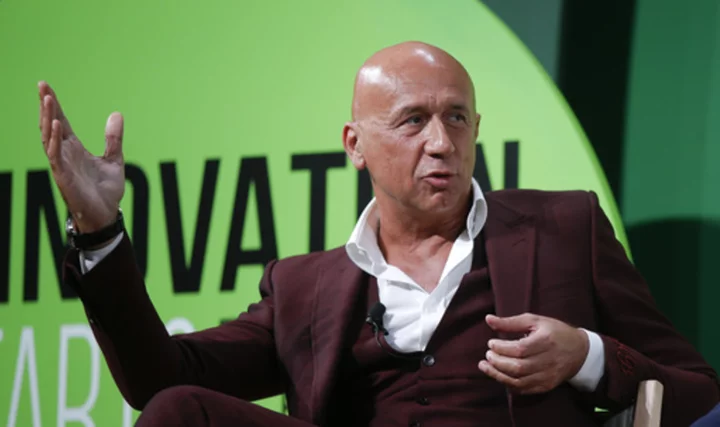
Gucci's CEO is stepping down as its French parent shakes up leadership
The president and CEO of Gucci is stepping down later this year
2023-07-19 19:23

Ukraine says Russia intentionally struck grain terminals, port in Odesa
KYIV Russia intentionally struck grain terminals and port infrastructure in Odesa in its latest air strikes, a senior
2023-07-19 17:26
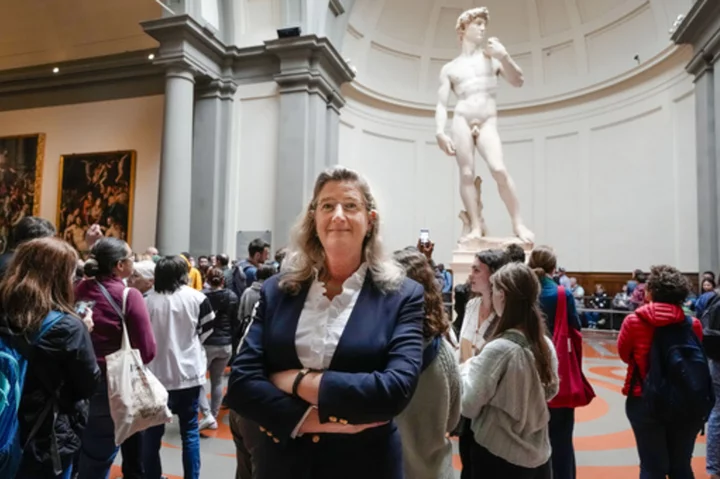
German director of Florence's Academy Gallery who defended David's image fears for museum's future
Since she arrived in 2015, the German director of Florence’s Accademia Gallery has succeeded in drawing visitors’ attention to masterpieces beyond Michelangelo’s towering David, while winning landmark court cases to protect the familiar image of the marble masterpiece against misuse
2023-07-19 16:15
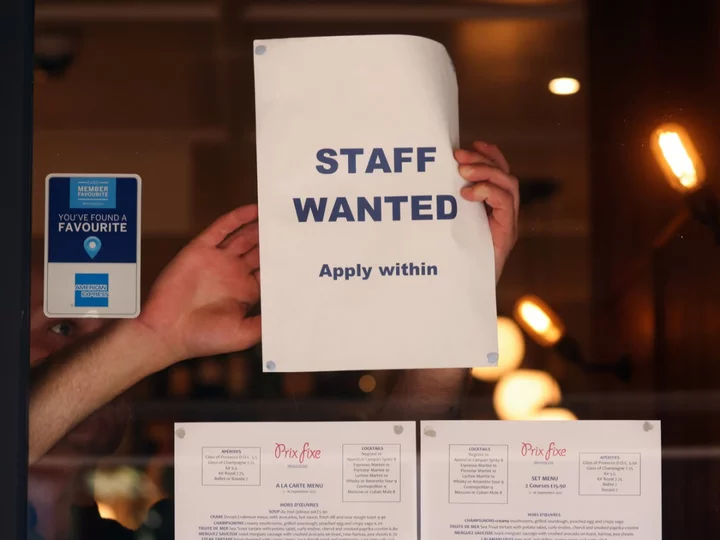
Between Brexit and Covid, London’s food scene has become a dog’s dinner – can it be saved?
London holds a special place in the hearts of food enthusiasts. In the halcyon days of the UK’s place in the European Union, it could even be said that the capital was one of the best cities in Europe – if not the best – for food. Despite it being beaten out by Paris in the Michelin guide (the French capital boasts 119 Michelin stars compared to London’s 74), the city’s sheer diversity made it stand out, with nearly every cuisine under the sun available somewhere in its streets. But recently it hasn’t really felt this way, and the people have noticed. Last week, Lily Allen tweeted: “Having been in New York for most of the time since Covid, I’ve spent long enough away to notice how far the standards have slipped in London’s restaurant scene… Delivery food and takeaways are even worse. Dunno if it’s Brexit or ghost kitchens or inflation or whatever, but it’s a terrible shame.” It’s evident from social media posts and online reviews that a lot of patrons feel the same. The restaurant industry has taken blow after blow in recent years, beginning with the UK’s messy divorce from the EU in 2016. And as it was trying to recover from Brexit, which resulted in increased costs, new bureaucracy and staff shortages, Covid hit. Restaurants were forced to shutter their doors for unknown periods of time, deal with confusing new rules, and magic whole new delivery systems out of thin air. Now, the industry is having to weather the cost of living crisis. In the face of all this, it might be a little cruel to denounce London’s usually thriving food landscape as “mediocre”. But, as painful as it might be, there is some truth to it. Ben Orpwood, a former contestant on the BBC reality series The Great British Menu, tells me that Allen’s observation, while perhaps a bit strongly worded, wasn’t completely wrong about the state of the industry. Orpwood, who was previously the executive chef at Gordon Ramsay’s Lucky Cat, has been cooking in some of the world’s finest kitchens for nearly two decades. But he says he’s never seen anything like the state of affairs at his latest opening, 20 Berkeley in Mayfair. “Normally when you first open a restaurant, the drop-off from the opening team [staff] is something like 20 per cent,” he explains. “You lose people who applied for something they’re not really ready for and opening week is very intense – so they go. But after we opened 20 Berkeley in June, apart from my core team, we had 100 per cent turnover. I’ve never seen anything like it.” He says that staff are leaving even with benefits like getting two meals a day, days and nights off, at least £13.50 an hour for employees with no prior experience, and a nice, conducive kitchen environment to work in – a far cry from the shouting and screaming he endured earlier in his career. “I had a pastry chef that left last week who worked 3pm-11pm, five days a week, no double shifts – he didn’t like how much work there was,” Orpwood marvels. “I can’t get my head around that mentality. The talent and the drive is just not there anymore, there are very few talented young chefs around and all the good restaurants are scrapping over them. When you’re going through that as a new restaurant, it makes it so much harder.” The chef, who has more than two decades of experience under his belt, explains that the aftermath of Brexit and Covid are primarily to blame. Brexit caused an exodus of EU citizens, many of whom questioned whether or not they were welcome in the UK. When Covid hit, more people returned to their home countries and discovered new work opportunities there, opting not to come back to British shores. “Then the government goes, ‘We’ll plug the shortage with young British workers’, except that they introduced needless academic requirements to apprenticeships with a minimum wage that people can’t pay their rent on,” Orpwood adds. The national minimum wage for apprentices aged 21 in their first year is £5.28 an hour, while the average rent for a room in London has rocketed to almost £1k a month. To say that we’re mediocre, I don’t really think it’s a fair reflection Ben Mulock Of course, some industry folk are more optimistic. Ben Mulock, executive chef of Balans, says: “The London food scene for me is still vibrant, it’s still innovative. We still have some great authenticity to it.” However, even the most positive outlook can’t ignore the biggest, most glaring problem restaurants currently face: the skills shortage. “I’ve been cooking since I was 14, and it’s never been like this throughout my entire career,” Mulock laments. “But we are striving and pushing our standards higher to try and give people the experience of years gone by with this new workforce. So, to say that we’re mediocre, I don’t really think it’s a fair reflection.” He adds that people who live in the capital have “some of the most discerning palates globally” and that feeding a London crowd “isn’t an easy thing to please”. “But when you get it right, it’s a wonderful, wonderful feeling,” he says. Perhaps, for anyone who lives outside of London, the bar has been set at an artificial high. Influencers invited to restaurants that have a marketing budget are more likely to post gushing reviews, complete with mouthwatering visuals as they stuff their gobs. Meanwhile, restaurant critics for broadsheets have been recently criticised for platforming establishments in more affluent areas, or only if they’ve been invited. Given some publications don’t pay for reviewers’ meals, this is unavoidable – but it generates a false economy in which readers believe those are the best places to eat. In his essay “London Finds Itself”, Vittles editor Jonathan Nunn wrote about the decline of reviews and the rise of simplified maps that pinpoint places to eat, which also manifests itself in lists. It’s why the algorithm adores those “10 stunning places to eat in London” videos, and why publications are desperate to churn out recommendation lists. He wrote: “The review is too discursive, too expensive to produce, written by people who demand to be paid properly. Far better to shop it all out to a freelancer who can google a bunch of stuff and stitch it together without context.” One has to wonder if this, too, has contributed to restaurants falling short of expectations – perhaps no one is looking closely enough. But Hugh Smithson-Wright, a communications specialist for restaurants, says that the food scene is no more mediocre than it’s ever been; in fact, there have always been plenty of middling eateries around. “Not everyone can be so great,” he says. “Some of my favourite restaurants have been places where food is absolutely fine.” But there’s a distinction to be made here. “Fine is OK if it’s not costing you a lot of money. Expensive is fine if the food is incredible. But now, with everything being so much more expensive for everyone on every income level, the places that are fine are getting more expensive, with smaller portions and cheaper produce, and that’s what we’re not tolerating.” Smithson-Wright points to the fate of Prezzo as a perfect example of this reduced level of tolerance. In April, the Italian restaurant chain closed 46 of its 143 branches and said it was due to soaring energy and food costs – but Smithson-Wright adds that its uninspired food was also a factor. “Prezzo was only fine – it wasn’t great or innovative, but as those prices go up, OK is not good enough. It’s these types of mid-range restaurants, whether chains or independent, that will find they have nowhere to go. They can’t suddenly make their food luxurious, and equally, they can’t suddenly charge the prices they perhaps need to be charging to keep the lights on.” Price is a painful topic right now, resulting in a bitter stand-off between some patrons and restaurateurs. But Britons have historically been averse to paying more for their food, lulled into a false sense of security by the cut-throat price war between supermarkets. Or a sense of: if I can spend less than £5 on a Sainsbury’s ready meal, why are restaurants charging three, four, or five times that for a main course? But, as Smithson-Wright points out, the “bravest thing a restaurant can do is charge what they need to” without fear of empty seats. “In some ways, restaurants punish themselves by not charging what they should and now they’re stuck in a mediocrity trap,” he says. “And they’re not helped by the psychological barrier people have over what they will pay for things.” So what does this mean for the future of food in London? The restaurant industry, as a whole, isn’t about to die any time soon. As Orpwood says, this is a resilient industry and will “just get on with it” until it comes out the other side with hopefully greener grass. Smithson-Wright adds that the current situation sounds a death knell for mid-level restaurants, many of which will not survive this period. But Mullock tries to offer a sunnier disposition. “The London food scene is alive and it’s doing some really good things. Everyone’s just pursuing deliciousness.” Read More Sorry lads, we just can’t afford any more reckless, middle-aged adventurers The dish that defines me: Alex Outhwaite’s Vietnamese bun cha Nappy changes and tantrums over Michael Gove: I took my one-year-old to a music festival Sunak rules out any new EU trade deal that undermines Brexit freedoms Tory MP broke rules over £150,000 loan from Russian businessman What is the future of the Conservative Party?
2023-07-19 13:52
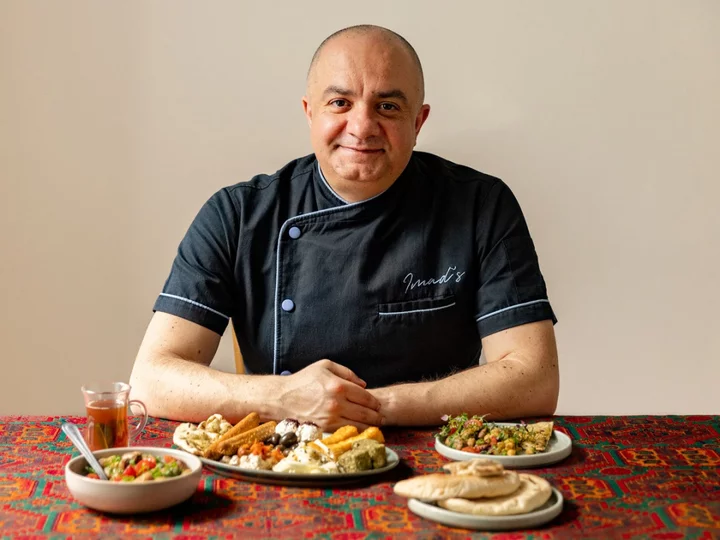
Imad Alarnab: In The Jungle, food restored our faith
Food can bring people comfort in the darkest times, and for Imad Alarnab, this time came when he was stranded as a refugee in Calais for more than two months. A hot plate had been donated, people collected leftovers from supermarkets, and having been a successful chef back in Damascus – with three restaurants, and a string of cafes and juice bars – Alarnab did what he did best, night after night, he cooked. “It was just something I felt like I needed to do, because you get to make a lot of people happy. Especially at that time, they needed something to be happy about,” says the 45-year-old, who would feed as many as 400 people at a time. The overcrowded camp that became known as The Jungle was close by, but Alarnab says it was too terrifying and overcrowded, so he and a group of several other Syrians slept on the steps of a church instead. And it was here he cooked the food of home – adapted, of course, depending on what they had. “To have a decent warm meal – for people whose lives have been on hold, they can’t cross to safety – was a big deal for all of us,” says the father-of-three. In fact, it was the first time he’d cooked for lots of people since all of his businesses were bombed within a week in 2012, in the country’s civil war, and this was the moment hope returned. “I think it restored all of the faith that things could, and would, get better,” Alarnab writes in his debut cookbook, Imad’s Syrian Kitchen. By July 2015, he’d made the painful decision to leave his wife and three daughters in Damascus to make the treacherous journey via Lebanon, Greece and North Macedonia, to the UK, where they had relatives. With his children too young to make the journey, the family planned to join once he’d been granted asylum. “If I had any other choice, I would have definitely taken it. [Fleeing] wasn’t the easiest but it was somehow the safest,” he says. “When I was in Syria during the war, people were saying, ‘It’s not safe to go out of the house because maybe you’re going to die’. But I needed to feed my family, if I stayed in the house they would die from hunger. There’s no good choice or bad choice, but maybe it’s the only one you can make. “When I was leaving Damascus, my oldest daughter made me promise I would see her within one year. I said, ‘Yes, I promise,’ but I wasn’t really sure if I was going to keep that promise or not.” And during the three months before he reached the UK – walking hundreds of miles on foot, on train, in the back of cars, on push bike, at the mercy of smugglers, with false IDs and the kindness of strangers – there were moments of doubt, like when he was crammed in the back of a lorry in Turkey for seven hours. “There were about 95 of us, I felt it was a stupid decision, risking my life so much. I believe the driver was so scared, or maybe drunk – the speed was absolutely scary. I thought we were not going to make it.” His journey ended eventually by using a fake passport to cross the Channel in October 2015 (the moving, often harrowing, story is weaved through his new cookbook), and first finding work illegally in a car wash, where he also slept as an overnight security guard, sending money home. After his family were able to emigrate (just under the year he’d promised his daughter) someone introduced him to the Cook For Syria scheme – and soon he was hosting super clubs at his house. By May 2021, he’d opened his London restaurant, Imad’s Syrian Kitchen. His first cookbook is a combination of dishes served up at the restaurant and his late mother’s recipes. “Almost every single dish is somehow related to my mother – I keep seeking her approval in everything I do in life, but especially with cooking,” he says. It was his mum, Summer, who first taught him to cook. “Even if you create your own recipes, somehow you will [always] be inspired by your first teacher”. She died very suddenly while Alarnab was living alone in a caravan in west London. Syrian food at its heart is “simple, first of all, and affordable for everyone”, he says. “We use a lot of mild spices, not very hot spices.” They’re mostly things you’ll know; “cumin, mint, garlic, nothing really special about it. [but] you put it together in a special way”. Middle Eastern in identity, much of it might feel familiar; tabbouleh, hummus, baklawa; while traditional dishes include buttered halibut, jaj bailfurn (grilled chicken thighs) and kippeh (lamb and bulgur wheat dumplings). Lunch is typically a feast of many dishes. “We’re a family of five and we never ever have one dish for lunch,” says Alarnab. “And we don’t throw anything away.” Before the war – which began as an uprising against President Bashar al-Assad in 2011 but has since involved a complex number of groups fighting one another, including so-called Islamic State, leaving at least 11 million people displaced – Alarnab was one of the lucky ones, he says. “We had a comfortable life, but most people in Syria were suffering. When you have a dictatorship for more than 50 years, of course people will be suffering. You cannot explain life without freedom to someone who’s lived all of their life with it. “People keep asking me silly questions – ‘Why did you have to go to 10 different countries to come to the UK? You could just get a plane ticket straight from Lebanon to Heathrow’. No, it doesn’t work like that. As a Syrian, my passport takes me to three countries – war zone countries. Even if I wanted to go to every country supporting Assad, I’d still need a visa.” Once the fighting started, food, that once brought him so much joy, lost all meaning. “I don’t know how to describe it, but the food tasted like blood. I know it’s disgusting, but nothing tasted the same. When you live in fear for your family, when your daughters are not safe to go to school, food will taste [bad], nothing can make you happy.” Cooking Syrian food now makes him feel “connected” to his home country, of course, “but it also makes me feel part of this unique community in the UK”. Arriving in London, he says: “I felt safe, I felt ‘I can be different, I can be myself, no one cares’. Everyone’s so different, it makes all of us lookalike.” Even after starting from scratch in a new country after losing everything, with a highly-acclaimed restaurant and now a cookbook, he’s most proud of his daughters. His eldest is studying at Warwick University after gaining straight As, his middle child is a talented artist. “The youngest [13] is the naughty one still,” he laughs. “But you can feel they appreciate their life – they are so happy about it.” ‘Imad’s Syrian Kitchen’ by Imad Alarnab (HQ; £26). Read More The National Portrait Gallery’s new restaurant is fabulous upgrade The dish that defines me: Alex Outhwaite’s Vietnamese bun cha 3 TikTok-approved recipes for picnic season It’s easier to make baklava at home than you might think Get set for Wimbledon with top pastry chef’s strawberry recipes Pinch of Nom: Healthy eating doesn’t have to cost the earth
2023-07-19 13:51

Martial arts superstar Bruce Lee's legacy endures 50 years on
Hong Kong businessman W. Wong still remembers the day in 1972 when he first heard neighbourhood kids rave about a figure who seemed larger...
2023-07-19 11:53

AI Is No Easy Fix for NFT Selloff, Says Creator of Historic $69 Million Artwork
The intersection of artificial intelligence and nonfungible tokens provides no simple antidote for the slump in the market
2023-07-19 11:15

Trolls compare Lisa Rinna to a Bratz Doll as 'RHOBH' star shares pics from Rinna Beauty photoshoot: 'Becoming more and more unrecognizable'
Internet reacts as Lisa Rinna gets compared to 'Bratz Doll' in latest photoshoot for Rinna Beauty
2023-07-19 09:29
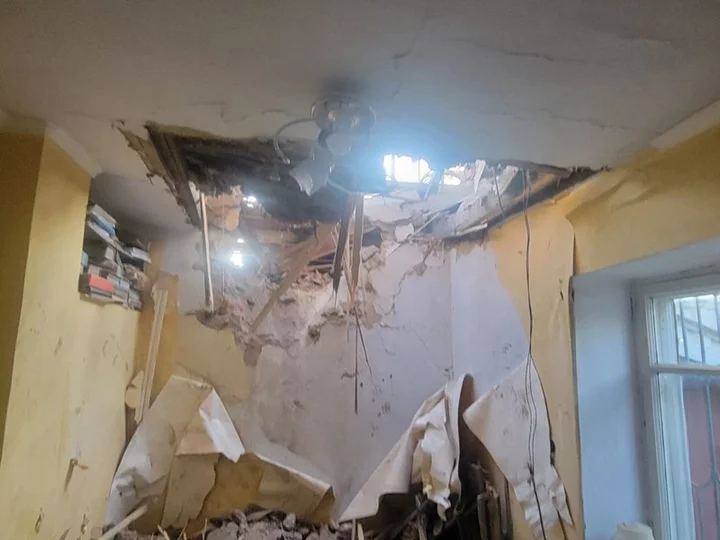
Russia carries out air strikes for second night on Ukraine's Odesa port -governor
Ukrainian air defence systems were engaged in the early hours of Wednesday in repelling a Russian air attack
2023-07-19 07:18
